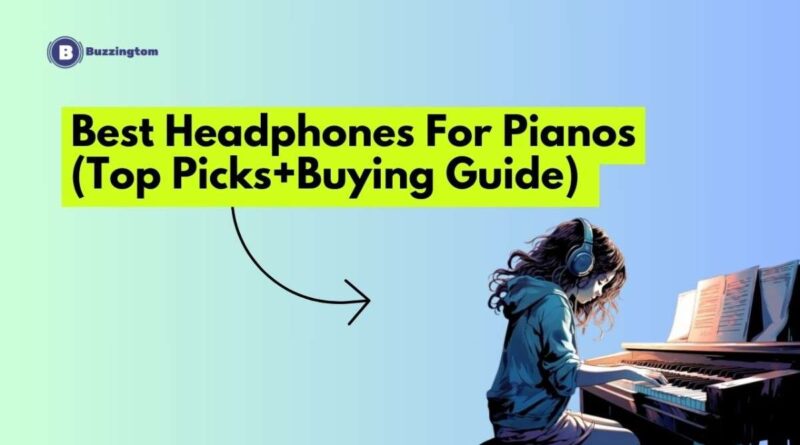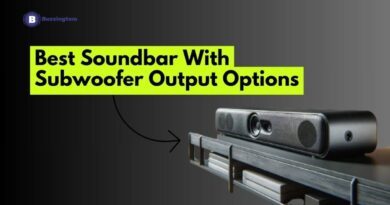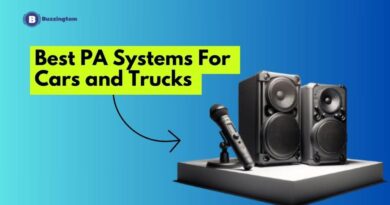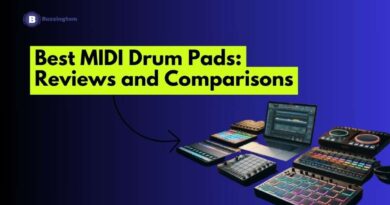Best Headphones For Pianos (Buying Guide)
Ever tried to practice piano while your roommate blasts heavy metal? Yeah, it’s not ideal. Here’s the thing: regular headphones just don’t cut it for piano practice. This guide is here to help you find the best headphones for piano that’ll block out distractions and keep you focused on those sweet, sweet tunes. We’ll break down the top options, keeping things clear and simple so you can get back to tickling the ivories (or whatever your preferred piano key action is called).
Best Headphones For Piano: Feature Comparison
|
Piano Headphones |
Sound Signature |
Noise Isolation |
Buy On Amazon |
OneOdio Wired Over Ear Headphones |
Bass-heavy |
Good |
|
Sennheiser Consumer Audio HD 560 S Headphones |
Neutral |
Low (Open-Back) |
|
Audio-Technica ATH-M50x Headphones |
Balanced |
Excellent (Closed-Back) |
|
Sony MDR-7506 |
Balanced |
Excellent (Closed-Back) |
|
Roland RH-5 Headphones |
Mid-range focus |
Excellent (Closed-Back) |
Top Headphones For Digital Piano and Keyboard
Here’s a curated list of top headphones for digital pianos and keyboards, with the OneOdio model as the top pick:
OneOdio Wired Over Ear Headphones: A Solid Budget Option
Taking the first place, these wired over ear headphones from OneOdio are a budget-friendly choice for those looking for a comfortable and decent-sounding pair of headphones. They’re particularly popular among DJs and music producers due to their focus on bass and their ability to swivel the ear cups for single-ear monitoring. However, how well they perform for piano or keyboard playing depends on your needs.
Pros:
- Affordable: OneOdio’s biggest selling point is their price. They are significantly cheaper than high-end audiophile headphones.
- Comfortable: Over-ear design with plush ear cups provides good passive noise isolation and a comfortable fit for extended wear.
- Decent Sound: These headphones offer clear audio with a focus on bass, which can be helpful for picking out low-end piano notes.
Cons:
- Not Ideal for Flat Response: Pianos benefit most from headphones with a flat frequency response, which reproduces sound accurately across the entire spectrum. OneOdio headphones tend to emphasize bass, which might color the sound of the piano.
- Sound Leakage: The closed-back design helps with noise isolation, but sound can still leak out at higher volumes. This might be a concern if you’re practicing late at night with others around.
Sennheiser HD 560 S: Audiophile Accuracy
The HD 560 S headphones from Sennheiser are a compelling choice for audiophiles seeking excellent sound quality at a reasonable price. Their strength lies in their neutral sound signature, which faithfully reproduces audio across the entire frequency range without favoring any particular tones. This makes them ideal for critical listening tasks like mixing and mastering audio, or for those who simply want to experience music exactly as the artist intended.
Pros:
- Accurate Sound Reproduction: The neutral sound signature ensures all musical elements are presented faithfully, making them ideal for critical listening.
- Open-Back Design for Spaciousness: Open-back headphones create a more natural and immersive listening experience, replicating the feeling of being surrounded by sound.
- Comfortable Design for Long Listening Sessions: Plush earcups and a lightweight build provide a comfortable fit for extended wear, crucial for those long practice sessions.
Cons:
- Open-Back Design Leaks Sound: This can be disruptive to others when playing digital piano, or keyboard in shared spaces or at night.
- Potentially Needs Separate Amplifier: While not essential for everyone, a dedicated headphone amp can improve the overall audio performance, adding an extra expense for some users.
Audio-Technica ATH-M50x: A Well-Rounded Option
Audio-Technica’s ATH-M50x headphones are a popular choice for many audiophiles, and for good reason. They boast a comfortable design with large, over-ear cups that provide excellent passive noise isolation. This is a big plus for piano practice, as it allows you to focus on your playing without distractions from outside noises. Additionally, the M50x headphones are known for their clear and detailed sound. Their large 45mm drivers deliver a well-balanced soundscape, helping you hear the intricacies of your playing across the entire piano register.
Pros:
- Isolation: Closed-back design minimizes distractions during practice.
- Clear Audio: Large drivers deliver detailed sound for accurate monitoring.
- Comfort: Plush ear cups provide a comfortable fit for extended sessions.
Cons:
- Bass-Heavy: The sound signature might overemphasize bass notes.
- Leakage: Sound can leak out at higher volumes, potentially disturbing others.
- Price: While not the most expensive, other options offer flatter response for pianos.
Sony MDR-7506: A Studio Workhorse
The Sony MDR-7506 are legendary closed-back studio headphones prized for their accurate sound reproduction, neutral midrange, and exceptional durability. While this translates well to detailed piano monitoring, their emphasis on higher frequencies might not be ideal for everyone.
Pros:
- Accurate Sound: MDR-7506 offers a clear and detailed soundscape, crucial for picking out nuances in piano playing.
- Closed-Back Design: Excellent passive noise isolation allows you to focus on your playing without distractions.
- Built to Last: Rugged construction ensures these headphones can handle the wear and tear of frequent use.
Cons:
- Bright Sound Signature: Slight emphasis on treble frequencies might make the piano sound a bit harsh.
- No Built-in Mic: Not ideal if you plan on recording yourself playing or using them for online lessons.
- Comfort for Long Sessions: The closed-back design can trap heat and cause some fatigue during extended listening sessions.
Roland RH-5: A Comfortable Choice
The Roland RH-5 headphones are a solid option for pianists seeking a comfortable and isolated practice experience. Equipped with large 40mm drivers, they deliver clear sound with a focus on the mid-range, which is crucial for capturing the nuances of piano tones. The closed-back design effectively blocks out external noise, allowing you to concentrate fully on your playing. While not audiophile-grade, the RH-5’s provide a well-balanced sound suitable for most practice scenarios.
Pros:
- Comfort: Plush ear cups and adjustable headband for long practice sessions.
- Noise Isolation: Closed-back design effectively blocks external noise.
- Mid-Range Focus: Clear sound emphasizes the core frequencies of piano tones.
Cons:
- Sound Leakage: Some sound leakage at higher volumes might disturb others nearby.
- Limited Portability: The single-sided cable might not be ideal for on-the-go use.
Things To Consider While Looking For Piano Headphones
Here are some things to consider while looking for piano headphones:
Closed-Back vs. Open-Back Headphones
- Closed-back headphones are essential for piano practice. They block out external noise, allowing you to focus on your playing and hear the nuances of your performance.
- Open-back headphones leak more sound and are not ideal for practicing piano, especially if you live with others or don’t want to disturb those around you.
Sound Quality
Look for headphones that offer a clear, balanced sound with good bass response. This will allow you to hear all of the notes you’re playing accurately.
Comfort
You’ll likely be wearing your headphones for extended periods, so it’s important to choose a pair that is comfortable to wear. Look for headphones with well-padded ear cups and a lightweight design.
Durability
Headphones that are built to last are important, especially if you’ll be using them frequently. Look for headphones with a sturdy construction and quality materials.
Price
Piano headphones range in price from around $50 to $500 or more. The best headphones for you will depend on your budget and your needs.
Here are some additional tips for choosing piano headphones
- Read online reviews: Before you buy any headphones, it’s a good idea to read online reviews from other musicians. This can help you get a sense of how the headphones perform and how comfortable they are to wear.
- Try before you buy: If possible, try out a few different pairs of headphones before you make a decision. This will help you find a pair that fits you well and that you like the sound of.
- Consider your needs: Think about how you’ll be using the headphones. If you’ll be using them for practicing piano at home, then you may not need a pair of headphones that are as high-end as if you were using them for recording in a studio.
Conclusion
With so many factors to consider, choosing the right piano headphones can feel overwhelming. But by focusing on closed-back designs, clear sound, comfort, and your budget, you’ll be well on your way to finding the perfect pair to elevate your practice sessions. Whether you’re a beginner or a seasoned player, high-quality headphones can make a big difference in your musical journey. Do any of the options we mentioned sound like a good fit for your needs?
Frequently Asked Questions
Do I need a special keyboard for piano practice with headphones?
No, any keyboard with a headphone jack will work for practicing piano with headphones. Most digital pianos have this feature. However, the quality of the built-in sounds on your keyboard can impact your experience.
Are keyboards and digital pianos the same thing?
Not exactly. Keyboards can be simpler instruments with fewer features, while digital pianos aim to replicate the feel and sound of an acoustic piano as closely as possible. Digital pianos typically have weighted keys and more realistic piano sounds.
What are the benefits of using headphones for piano practice?
- Practice anytime: Play without disturbing others, allowing for late-night sessions.
- Focus on your playing: Block out external noise for better concentration.
- Hear the details: Headphones often provide a clearer and more accurate sound than built-in speakers.
- Control the volume: Adjust the volume to a comfortable level without affecting others.
Can I use regular headphones for piano practice?
Technically yes, but it’s not ideal. Regular headphones may not offer good noise isolation or an accurate sound profile for piano music. Investing in a dedicated pair of piano headphones can significantly improve your practice experience.




